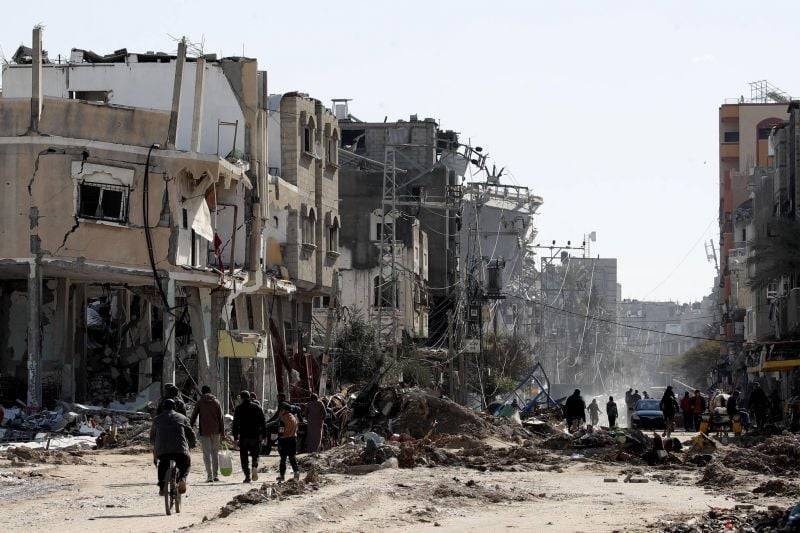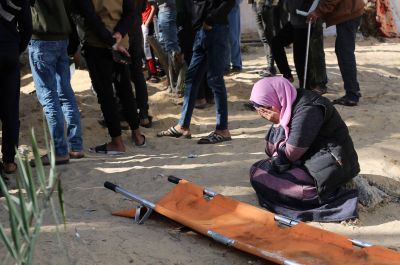
People walk past destroyed buildings in the Maghazi camp for Palestinian refugees, which was severely damaged by Israeli bombardment amid the ongoing conflict in the Gaza Strip between Israel and the Palestinian militant group Hamas, in the central Gaza Strip on Feb. 1, 2024. (Credit: Anas Baba/AFP)
A Haaretz investigation into ZAKA — an Israeli ultra-Orthodox private organization that retrieves human remains after attacks and disasters — revealed cases of "negligence, misinformation, and a fundraising campaign that used the dead as props" during the organization's work following the Hamas-led Oct. 7 attack in southern Israel.
While involved in collecting the remains of those who died in Israel on the day that triggered the war on Gaza, ZAKA volunteers circulated "several stories without any basis," such as one about how they found "the burnt and mutilated bodies of 20 children," according to the Haaretz report.
Haaretz opens its recollection of events with a scene in which a group of ZAKA members lounged next to a dead body wrapped in a white plastic bag in Kfar Aza during the second week of the war, prompting interrogation from fellow volunteers.
"The investigation revealed that three of the ZAKA volunteers were actually 'making video calls and videos for fundraising purposes.'" A non-ZAKA observer said that "the body was part of a staged setting – an exhibit designed to attract donors."
The organization responded to this account of events with a statement that "no fundraising calls were made on the ground on behalf of the organization and if any specific incident is brought to our attention, we will examine and deal with it."
The organization is also accused by Haaretz of "spreading accounts of atrocities that never happened, releasing sensitive and graphic photos, and acting unprofessionally on the ground."
Among the accusations of unprofessional work an officer told Haaretz, "We received bags of theirs without documentation and sometimes with body parts that were unrelated to one another."
One of the volunteers who worked at Shura military base, which was made a body identification center, also told Haaretz that "there were bags with two skulls, bags with two hands, with no way to know which was whose."
Moreover, ZAKA claimed that some places were "cleared of body parts when that wasn't the case," Haaretz added, citing Home Front Command soldiers and volunteers from other organizations.
'Insolvency'
The organization was "entangled in debts of millions of shekels" and faced "insolvency" on the eve of the war, but a source at ZAKA told Haaretz that the organization had raised over 50 million shekels ($13.7 million) since Oct. 7.
The newspaper assured that raising funds for an organization is a legitimate act, but that "its timing and how it was done raise concerns."
"These concerns are certainly not diminished by the fact that ZAKA hired the services of a public relations office that, already in the first weeks of the war, accompanied and photographed the volunteers."
The Israeli newspaper also reported that there is a relationship between the organization and the Israeli Home Front Command.
In the first days of the war, the Israeli army decided to forego the deployment of hundreds of soldiers specifically trained in identifying and collecting human remains in the event of a mass casualty. Instead, the Home Front Command chose to use ZAKA, alongside soldiers in the Military Rabbinate's search unit.
Despite a shortage of personnel, the Haaretz investigation reveals that when Military Rabbinate soldiers reported for reserve duty on Oct. 7, to be tasked with searching for and collecting casualties, they were told they had to wait.
"I have no explanation for why they didn't deploy [the Home Front Command's unit] and our people from the north," an officer in Rabbinate's southern search unit said.
During the war, Home Front Command soldiers appeared in the media wearing "non-IDF vests on which the name 'ZAKA' was emblazoned."
Haim Outmezgine, head of ZAKA's "special forces," links the organization to the Home Front Command as he also serves in the reserves in the Home Front Command's rescue unit. He is "one of the senior officials who appeared in this outfit frequently," according to Haaretz.
Some sources told Haaretz that he also played "a central role in the association between the organization and the Israeli army and was in command of several sites starting from the evening of the attacks."
"Disputes between organizations working to gather human remains from the sites of attacks or other incidents in Israel is nothing new," explained Haaretz, mentioning the fact that this kind of work "can generate a lot of money."
Three main organizations are working in the field today: ZAKA Jerusalem, ZAKA Tel Aviv, and the 360 Unit organization.
